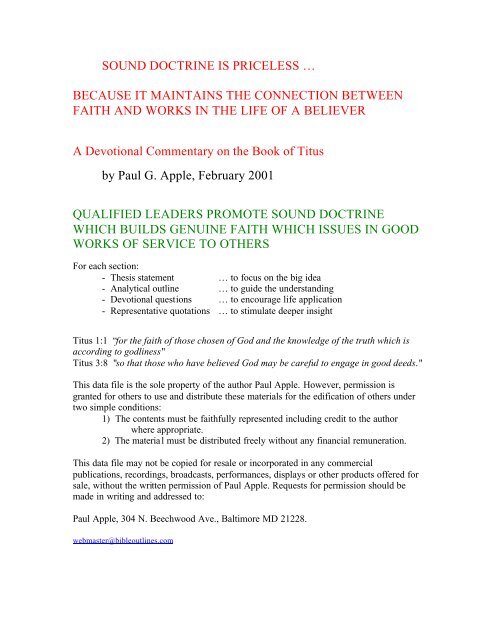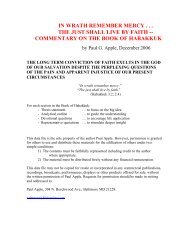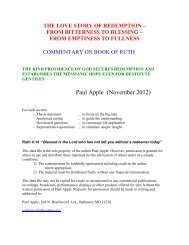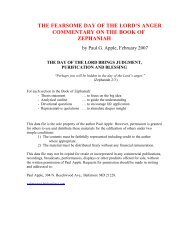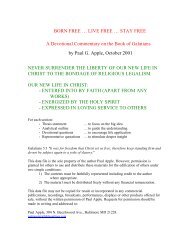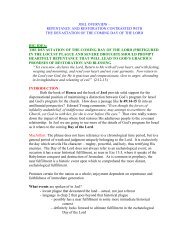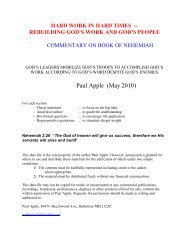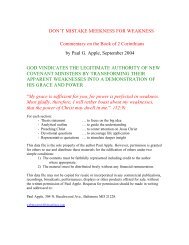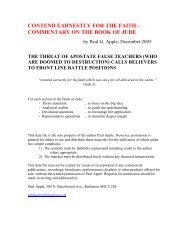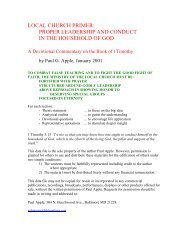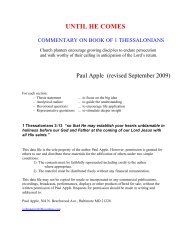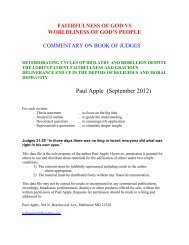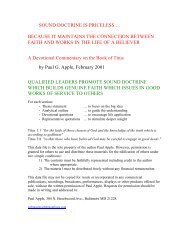SOUND DOCTRINE IS PRICELESS - Free sermon outlines, Bible ...
SOUND DOCTRINE IS PRICELESS - Free sermon outlines, Bible ...
SOUND DOCTRINE IS PRICELESS - Free sermon outlines, Bible ...
Create successful ePaper yourself
Turn your PDF publications into a flip-book with our unique Google optimized e-Paper software.
<strong>SOUND</strong> <strong>DOCTRINE</strong> <strong>IS</strong> <strong>PRICELESS</strong> …BECAUSE IT MAINTAINS THE CONNECTION BETWEENFAITH AND WORKS IN THE LIFE OF A BELIEVERA Devotional Commentary on the Book of Titusby Paul G. Apple, February 2001QUALIFIED LEADERS PROMOTE <strong>SOUND</strong> <strong>DOCTRINE</strong>WHICH BUILDS GENUINE FAITH WHICH <strong>IS</strong>SUES IN GOODWORKS OF SERVICE TO OTHERSFor each section:- Thesis statement … to focus on the big idea- Analytical outline … to guide the understanding- Devotional questions … to encourage life application- Representative quotations … to stimulate deeper insightTitus 1:1 “for the faith of those chosen of God and the knowledge of the truth which isaccording to godliness"Titus 3:8 "so that those who have believed God may be careful to engage in good deeds."This data file is the sole property of the author Paul Apple. However, permission isgranted for others to use and distribute these materials for the edification of others undertwo simple conditions:1) The contents must be faithfully represented including credit to the authorwhere appropriate.2) The material must be distributed freely without any financial remuneration.This data file may not be copied for resale or incorporated in any commercialpublications, recordings, broadcasts, performances, displays or other products offered forsale, without the written permission of Paul Apple. Requests for permission should bemade in writing and addressed to:Paul Apple, 304 N. Beechwood Ave., Baltimore MD 21228.webmaster@bible<strong>outlines</strong>.com
ABOUT THE AUTHORPaul majored in English at Princeton University and graduated with a Master of Divinitydegree from Grace Theological Seminary in Winona Lake, IN in 1979. He lives in theBaltimore area with his wife. His family is actively involved in local Christianministries.
BACKGROUNDRyrie: "The probably order of significant events is(1) Paul was released from his house arrest in Rome (where we find him at the end ofActs), probably because his accusers did not choose to press their charges against himbefore Caesar (Acts 24:1; 28:30). Their case, therefore, was lost by default, and Paul wasfreed.(2) Paul visited Ephesus, left Timothy there to supervise the churches, and went on toMacedonia (northern Greece).(3) From there he wrote 1 Timothy (1 Tim. 1:3).(4) He visited Crete, left Titus there to supervise those churches, and went to Nicopolisin Achaia (southern Greece, tit. 3:12).(5) Either from Macedonia or Nicopolis, he wrote this letter to encourage Titus.(6) He visited Troas (2 Tim. 4:13), where he was suddenly arrested, taken to Rome,imprisoned, and finally beheaded.(7) From Rome, during this second imprisonment, he wrote 2 Timothy."Wiersbe: "Titus had his share of problems! The churches needed qualified leaders, andthe vaious groups in the churches needed shepherding. One group of false teachers wastrying to mix Jewish law with the Gospel of grace (Titus 1:10, 14), while some of theGentile believers were abusing the message of grace and turning it into license (2:11-15).By nature, the people of Crete were not easy to work with (1:12-13), and Titus neededextraordinary patience and love."Kent: "The Epistle to Titus is likewise a pastoral letter and not a mere personal letter,because it was intended to convey through Titus a message to the church."Barnes: "The principal difficulties which it was apprehended Titus would meet with inthe performance of his duties there, and which in fact made his labours there desirable,arose from two sources: (1) the character of the Cretans themselves; and (2) the influenceof Judaizing teachers.(1) The character of the Cretans themselves was such as to demand the vigilance andcare of Titus. They were a people characterized for insincerity, falsehood, and grossliving, chap. 1. 12. There was great danger, therefore, that their religion would be hollowand insincere, and great need of caution lest they should be corrupted from the simplicityand purity required in the gospel, chap. i. 13.
(2) The influence of Judaizing teachers was to be guarded against. It is evident fromActs ii. 11, that there were Jews residing there; and it is probable that it was by those whohad gone from that island to Jerusalem to attend the feast of the Pentecost, and who hadbeen converted on that occasion, that the gospel was first introduced there. From thisepistle, also, it is clear that one of the great dangers to peity in the churches of Crete,arose from the efforts of such teachers, and from the plausible arguments which theywould use in favour of the Mosaic law; see chap. i. 10, 14-16; iii. 9. To counteract theeffect of their teaching, it was necessary to have ministers of the gospel appointed inevery important place, who should be qualified for their work. To make thesearrangements, was the great design for which Titus was left there; and to give him fullinformation as to the kind of ministers which was needed this epistle was written."
OUTLINE OF TITUS<strong>SOUND</strong> <strong>DOCTRINE</strong> <strong>IS</strong> <strong>PRICELESS</strong> …BECAUSE IT MAINTAINS THE CONNECTION BETWEENFAITH AND WORKS IN THE LIFE OF A BELIEVERQUALIFIED LEADERS PROMOTE <strong>SOUND</strong> <strong>DOCTRINE</strong>WHICH BUILDS GENUINE FAITH WHICH <strong>IS</strong>SUES IN GOODWORKS OF SERVICE TO OTHERS1:1-4 OPENING GREETINGSTHE PROCLAMATION OF THE WORD OF GOD <strong>IS</strong> A SACRED TRUSTA. THE PROCLAMATION OF THE WORD <strong>IS</strong>SUES FROM A SENSE OFDIVINE CALLINGB. THE PROCLAMATION OF THE WORD AIMS AT VERY LOFTY GOALSC. THE PROCLAMATION OF THE WORD CENTERS AROUND THEMANIFESTATION OF THE GOSPEL MESSAGE IN H<strong>IS</strong>TORYD. THE PROCLAMATION OF THE WORD <strong>IS</strong> A SACRED TRUSTE. THE PROCLAMATION OF THE WORD MUST BE REPRODUCED IN EACHSUCCEEDING GENERATIONI. (1:5-9) APPOINT QUALIFIED ELDERS WHO CAN TEACH AND DEFEND<strong>SOUND</strong> <strong>DOCTRINE</strong>"holding fast the faithful word which is in accordance with the teaching"A. (:5) THE NEED FOR ELDERSB. (:6-9A) THE QUALIFICATIONS FOR ELDERSC. (:9B) THE FUNCTION OF ELDERS (WITH RESPECT TO <strong>SOUND</strong> <strong>DOCTRINE</strong>)II. (1:10-16) REPROVE REBELLIOUS TROUBLEMAKERS WHO SUBVERT<strong>SOUND</strong> <strong>DOCTRINE</strong> AND DENY GOD BY THEIR DEEDS"men who turn away from the truth"
A. (:10-11) SILENCE THE FALSE TEACHERSB. (:12-14) RESCUE THE GULLIBLEC. (:15-16) D<strong>IS</strong>CERN THE FALSE FROM THE TRUE -- LOOK AT THEIR DEEDSIII. (2:1-3:11) PROCLAIM THE NECESSITY OF GOOD WORKS TO ADORN<strong>SOUND</strong> <strong>DOCTRINE</strong>"adorn the doctrine of God our Savior"A. (:2:1-10) WHAT DOES <strong>SOUND</strong> <strong>DOCTRINE</strong> LOOK LIKE WHEN IT <strong>IS</strong> ALLDRESSED UP AND ON D<strong>IS</strong>PLAY?THE CONDUCT OF EVERY SEGMENT OF THE CHURCH MUST REFLECT ANDENHANCE (ADORN) THE MESSAGE OF <strong>SOUND</strong> <strong>DOCTRINE</strong> RATHER THANDETRACT(:1) INTRODUCTION1. (:2) CONDUCT OF OLDER MEN2. (:3-4A) CONDUCT OF OLDER WOMEN3. (:4-5) CONDUCT OF YOUNG WOMEN4. (:6-8) CONDUCT OF YOUNG MEN5. (:9-10) CONDUCT OF SLAVESB. (2:11-15) THERE <strong>IS</strong> NO TIME LIKE THE PRESENT FOR GOOD DEEDS --THE PEOPLE OF GOD IN TH<strong>IS</strong> PRESENT AGE (BETWEEN CHR<strong>IS</strong>T'S FIRSTCOMING TO USHER US INTO SALVATION AND H<strong>IS</strong> SECOND COMING TOUSHER US INTO GLORY) NEED TO DEVOTE THEMSELVES TO PERSONALHOLINESS AND UNSELF<strong>IS</strong>H GOOD DEEDS1. (:11) CHR<strong>IS</strong>T'S FIRST COMING = OUR ENTRANCE INTO SALVATION2. (:12) CALL FOR PERSONAL HOLINESS3. (:13) CHR<strong>IS</strong>T'S SECOND COMING = OUR ENTRANCE INTO GLORY4. (:14) CALL FOR GOOD DEEDS(:15) CLOSING EXHORTATION: COMMUNICATE THESE THINGS WITHAUTHORITY
C. (3:1-7) WHAT'S THE CONNECTION BETWEEN GOOD WORKS ANDSALVATION?GOOD DEEDS ARE THE NATURAL EXPRESSION OF A CONVERTED LIFE, NOTTHE BAS<strong>IS</strong> FOR SALVATION1. (:1-2) REMINDER TO PURSUE GOOD DEEDS CONS<strong>IS</strong>TENTLY --DON'T FALL BACK INTO THE OLD WAYS2. (:3) DESCRIPTION OF PRE-CONVERSION DEPRAVITY3. (:4-5A) SALVATION ON THE BAS<strong>IS</strong> OF GRACE, NOT GOOD WORKS4. (:5B-6) REGENERATION ACCOMPL<strong>IS</strong>HED BY THE GODHEAD, NOT BYGOOD WORKS5. (:7) ETERNAL DESTINY SECURED BY JUSTIFICATIOND. (3:8-11) <strong>SOUND</strong> <strong>DOCTRINE</strong> <strong>IS</strong> PROFITABLE BECAUSE IT ALWAYS LINKSGENUINE FAITH TO GOOD DEEDS1. (:8) PROMOTE <strong>SOUND</strong> <strong>DOCTRINE</strong> WHICH <strong>IS</strong> PROFITABLEa. Promote Sound Doctrine with Confidenceb. Promote Sound Doctrine so that Faith Remains Linked to Good Deedsc. Promote Sound Doctrine Because it is Priceless2. (:9-11) REJECT CONTENTIOUS SUBJECTS AND TEACHERS WHICH ARENOT PROFITABLEa. Reject Speculative Subjects that Stir up Strifeb. Reject Contentious Teachers Who Divide the Church(3:12-15) CLOSING GREETINGSTHE FRUIT OF THE GOSPEL <strong>IS</strong> MANIFESTED IN GOOD DEEDS OF SERVICETO OTHERS IN NEED
TEXT: TITUS 1:1-4TITLE: OPENING GREETINGSBIG IDEA:THE PROCLAMATION OF THE WORD OF GOD (WITH ITS MESSAGE OFETERNAL LIFE) <strong>IS</strong> A SACRED TRUSTI. THE PROCLAMATION OF THE WORD <strong>IS</strong>SUES FROM A SENSE OF DIVINECALLINGWhich results in an absolute commitment to the will of God; commissioned to fulfill acallingA. Paul as a Bond-servant of God -- Relationship characterized by Humility andSubmission and DependenceKent: "A slave (doulos) is one who gives himself up wholly to another's will."B. Paul as an Apostle of Jesus Christ -- Relationship characterized by Privilege andMissionApostle used in the narrow sense of the 12II. THE PROCLAMATION OF THE WORD AIMS AT VERY LOFTY GOALSA. The Progress of Faith on the Part of the Elect"for the faith of those chosen of God"Understand that Faith is not for everyonekata -- in the interest of; pertaining toHendriksen: "The service and apostleship are exercised 'in the interest of' (that seems tobe the meaning of kata here; cf. John 2:6; II Cor. 11:21) the faith of God's elect and(their) acknowledgment of the truth which accords with godliness; that is, they arecarried out in order to further or promote the reliance of God's chosen ones upon him,and their glad recognition or confession of the redemptive truth which centers in him; atruth which, in sharp contrast with the vagaries of false teachers, accords with (or herealso 'is in the interest of,' 'promotes') godliness, the life of Christian virtue, the spirit ofconsecration."B. The Increase in the Knowledge of the TruthRead through the pastoral epistles and you will see that Paul never disparagestruth or sound doctrine. These are always pursued with the utmost intensity. For himthere is always the practical connection to a life of holiness.C. The Corresponding Increase in Practical Godliness
understanding that real spiritual truth is always "according to godliness"This connection between sound doctrine and good deeds and practical godlinessis going to be a major emphasis of this epistleD. The Certain Realization of Eternal Life"in the hope of eternal life"Kent: "Eternal life is here spoken as a 'hope' because it has many aspects as yetunrealized, even though it is a present possession of the believer."III. THE PROCLAMATION OF THE WORD CENTERS AROUND THEMANIFESTATION OF THE GOSPEL MESSAGE IN H<strong>IS</strong>TORYA. Promised by a Faithful God"which God, who cannot lie, promised long ages ago"B. Manifested at the Proper Time in History"but at the proper time manifested"History is essentially "His story"Gal. 4:4Guthrie: "The due times of the manifestation are in contrast to the eternal times of thepromise, and point to the appropriate events appointed by God for His self-revelation inChrist."C. Summed up as the LOGOS"even His word"The written Word reveals the Living Word; there seems to be some connection here tothe message of John 1:1-18 where the Logos is in view; the message of eternal life isrevealed in the Word.Hiebert: "'His Word' is not the personal Christ, the Logos, but rather the saving messageof the gospel. This message was made known 'at his appointed season,' the opportuneseasons established by God in his eternal wisdom. All history was the preparation forthat revelation."IV. THE PROCLAMATION OF THE WORD <strong>IS</strong> A SACRED TRUST"in the proclamation with which I was entrusted according to the commandmentof God our Savior"
Guthrie: "The word made known through preaching must be the message of the gospel,which forms the content of Christian preaching. The idea of having such ministrycommitted to him … was a constant source of wonderment to Paul (e.g. Gal. i. 1, ii. 7),and is reiterated in all the Pastorals (cf. 1 Tim. i. 11; 2 Tim. I, 11)."Barnes: "Paul always claimed to be divinely commissioned, and afirmed that he wasengaged in the work of preaching by the authority of God; see Gal. i. 1, 11, 12; 1 Cor. i.1; Rom. i. 1-5."Kent: "The designation 'our Saviour God' occurs three times in 1 Timothy and threetimes in Titus, and is one of the distinctive marks of these Pastoral Epistles."V. THE PROCLAMATION OF THE WORD MUST BE REPRODUCED IN EACHSUCCEEDING GENERATION"to Titus, my true child in a common faith"Lenski: "'Child' expresses dearness, and 'genuine' an acknowledgment that Titus (likeTimothy) runs true to his spiritual parentage and will so transmit these instructions."(:4B) SALUTATION"Grace and peace from God the Father and Christ Jesus our Savior"Hiebert: "'Grace' here is the unmerited favor of God at work in the life of the believer,while 'peace' is the resultant experience of harmony and well-being in the life of thereconciled."* * * * * * * * * *DEVOTIONAL QUESTIONS:1) Do we look at our life as having an impact on the faith of others or on thedevelopment of their knowledge on their increase in godliness? What goals are weshooting for?2) Read the entire epistle several times to get an overview. How many times is theconnection made between sound doctrine and good works (or godliness)?3) How can we better draw comfort and strength from the promises of God, knowingthat God "cannot lie"?4) What was so "proper" or "appropriate" for the timing God chose for the
manifestation of the person of Christ and the gospel message?* * * * * * * * * *QUOTES FOR REFLECTION:Expositor's: "Paul's office as apostle was not dependent in any way on the faith orknowledge of human beings, as it was on the will or command of God or Chirst. Thefinal cause of it was the faith and knowledge of men."Wiersbe: "Throughout all three of the Pastoral Epistles there is an emphasis on teachingthe Word of God. Local churches ought to be '<strong>Bible</strong> institutes' where the Word of Godis taught systematically and in a practical way."Hendriksen: "Here as elsewhere (especially in lengthy salutations) the salutation is inline with the character and purpose of the epistle. Thus, it comes as no surprise that inTitus, which stresses the idea that sound doctrine goes hand in hand with the life ofsanctificaiton and the doing of good works, the very salutation already mentionsgodliness … and over against the mendacious character of the Cretans (Titus 1:12)makes mention of the never-lying God."Hiebert: "The Epistle of Titus covers the same general ground as 1 Timothy, but ismore compact and less personal. Its greater part deals with ministerial duties and socialrelations, yet it contains no fewer than three summary passages that are theologicalgems (1:1-3; 2:11-14; 3:3-7). In 1 Timothy Paul stressses sound doctrine; in Titus hestresses worthy Christian truth. Nowhere else does Paul more forcefully urge theessential connection between evangelical truth and the purest morality than in this briefletter. Here the basic truths of the gospel are displayed in the abiding glory of theirsaving and sanctifying appeal. The regenerating work of the Holy Spirit is theexperiential basis for Chrsitian conduct (3:3-7)."
TEXT: TITUS 1:5-9TITLE: <strong>SOUND</strong> <strong>DOCTRINE</strong> REQUIRES <strong>SOUND</strong> ELDERSBIG IDEA:APPOINT QUALIFIED ELDERS WHO CAN TEACH AND DEFEND <strong>SOUND</strong><strong>DOCTRINE</strong>I. (:5) NEED FOR ELDERSA. Sometimes The Way to Get Ahead is to be Left Behind"For this reason I left you in Crete"B. Orderliness is Next to Godliness"that you might set in order what remains"C. Plurality of Elders is the Norm for the Local Church"and appoint elders in every city"D. The Form of Church Government is Not Optional"as I directed you"II. (:6-9A) QUALIFICATIONS FOR ELDERSA. Gender Requirement -- "if any man"B. General Requirement -- "be above reproach" (:6)"for the overseer must be above reproach as God's steward" (:7)C. Family Requirements1. With respect to His Wife"the husband of one wife"2. With respect to His childrena. Positive -- "having children who believe"D. Character Requirements1. "not self-willed"b. Negative -- "not accused of dissipation or rebellion"Kent: "This adjective is derived from hedomai, enjoy oneself, take pleasure, andautos, self. Thus comes the meaning of self-pleasing, self-willed, arrogant.
1) Should every local church be governed by a plurality of elders, or just every city seea functioning of multiple elders? What type of government would you have if only oneelder ruled in the local church? (Study other corresponding NT passages to help shedlight on this issue.)2) How is it even possible to be "above reproach"? What does Paul mean by thisgeneral requirement? What type of investigation or examination is required to reachsuch a verdict?3) What is our standard for faithfulness on the part of those we employ? What aresome of our expectations? What is God's standard for faithfulness on the part of thosewho would be stewards of His message of eternal life?4) How can one perform the functions of exhorting and refuting without manifesting anargumentative spirit?* * * * * * * * * *QUOTES FOR REFLECTION:Guthrie: "The minister must have clear convictions and an understanding of the'teaching' (presumably that which was passed on by oral tradition, although it maypossibly refer to some written records; cf. Simpson), and he must be prepared to clingto the truth even in face of opposition. Only so will he be able to perform the doubletask of exhorting others and correcting those who contradict the truth."Ritchie: "The first thing Paul says is, "If any man." Note that elders are to be men, thatthey are to function as men called by God, to continue their role of headship asdesigned by God in creation. All the elders throughout the history of Israel were men.Even though he was surrounded by godly women, Jesus appointed 12 men as apostles.Though the apostles in turn were surrounded by godly women, they appointed onlymen. The issue is function, not equality of personhood. This is the way God wantshis church to function--by choosing men to be elders."Hiebert: "Doctrinal fitness is also necessary. The overseer must be known to 'holdfirmly to the trustworthy message,' clinging to it despite the winds of false teaching andopen opposition. 'Trustworthy' underlines that the Christian gospel is perfectly reliableand completely worthy of his confidence. He must adhere to the Word 'as it has beentaught' and be in accord with the teaching given by the apostles. Unfaithfulness to thebiblical revelation disqualifies a man for leadership in God's church. Doctrinal fidelitywill give him a standing ability to perform a twofold task: First, he is to 'encourageothers by sound doctrine,' apealing to them to adhere to and advance in their Christianfaith. This can be done by proclaiming 'sound doctrine,' teaching that is not onlycorrect but healthful, promoting spiritual health, in contrast to the unhealthy falseteaching. Secondly, his work also demands that he 'refute those who oppose' the truegospel and speak against it as the advocates of error. He must 'refute' them by exposing
their error and trying to convince them that they are wrong. Christian truth needs notonly defense against attacks, but also clear exposition. Effective presentation of thetruth is a powerful antidote to error."Wallis: "Paul gives three general qualifications (v.6), a list of negatives (v. 7), and a listof positive qualifications (vv. 8,9). The whole section is closely parallel to 1 Tim 3:2-4."
TEXT: TITUS 1:10-16TITLE: SILENCE THE WOLVESBIG IDEA:REPROVE REBELLIOUS TROUBLEMAKERS WHO SUBVERT <strong>SOUND</strong><strong>DOCTRINE</strong> AND DENY GOD BY THEIR DEEDSI. (:10-11) SILENCE THE FALSE TEACHERSKey: "who must be silenced"Hendriksen: "Paul uses a rare verb which has as its primary meaning 'to stop the mouthby means of a bridle, muzzle, or gag.' The deceivers, then must not be tolerated but besilenced, and this should be done by Titus and by the elders…"A. Their Number -- "For there are many"B. Their Character -- "rebellious men"refusing to submit to any authorityC. Their Methodology and Results1. "empty talkers"2. "deceivers"Hendriksen: "achieving no useful purpose, with their fictitious tales about Adam,Moses, Elijah, etc., and with their legalistic hair-splitting (cf. 1 Tim. 1:6); yet deceivingthe minds of the weak."D. Their Primary Background -- "especially those of the circumcision"E. Their Disruptive Impact -- "because they are upsetting whole families"Bassler: "The picture that emerges is one of a somewhat less than cohesive churchstructure in which a lot of the teaching activity takes place in various households."Hendriksen: "In the church of God there is no such thing as 'freedom of misleadingspeech.' Reason: it would be too dangerous."F. Their Message -- "teaching things they should not teach"G. Their Motivation -- "for the sake of sordid gain"II. (:12-14) RESCUE THE GULLIBLE
A. (:12-13A) This Problem of False Teaching in Crete Should be no Surprise(once you understand both:- the character of the false teachers- the susceptibility of the people to error)2 or 3 different groups in view here -- false teachers inside the church who werepossibly true believers and needed correction; false teachers either inside or outside thechurch who were false professors of faith with a strong Jewish background; and thosegullible church members who were being unduly influenced away from the faith1. Confirmed by their Own Testimony"One of themselves, a prophet of their own, said"Paul not speaking in some type of harsh, judgmental spirit2. Character of the False Teachers (and to a lesser extent of the Gullible People)a. "Cretans are always liars"explains how they can embrace a false messageb. "evil beasts"explains how they can exert such an evil, disruptive influencec. "lazy gluttons"explains their motivation of seeking to profit by attracting afollowing3. Validity of this Testimony -- "This testimony is true"B. (:13B-14) Necessity for Correction in order to Rescue the Gullible1. Confrontation -- "Reprove them severely"2. Goal -- "that they may be sound in the faith"Kent: "Some broaden the scope of 'they' (subject of the verb 'be healthy') toinclude not just the false teachers, but the victims of their teaching as well.""the faith" = the body of truth that is in accordance with sound doctrine3. Warning Against Distractions and Disruptive Influencesa. "not paying attention to Jewish myths"b. "and commandments of men who turn away from the truth"III. (:15-16) D<strong>IS</strong>CERN THE FALSE FROM THE TRUE -- LOOK AT THEIR
DEEDSTwo Contrasts presented:A. (:15) Contrast Between Pure and Defiled1. "To the pure, all things are pure"2. "but to those who are defiled and unbelieving, nothing is pure"3. Total Depravity -- Pervasive Defilementa. "but both their mind"b. "and their conscience are defiled"Bassler: "… instead of becoming or keeping themselves pure by eating only purethings, the very fact that they consider anything impure and therefore need regulationsfor their own purity is the demonstration that the false teachers are themselves defiled.They are so precisely because they are also unbelieving, that is, not putting their trust inChrist. Thus in the new Age, everything is new. The one who seeks purity byobedience to regulations, that is, human commandments, turns out not to be one ofGod's people at all, but among the unbelieving."Hiebert: "A moral perversion has taken place in their whole being. Their 'minds,' theirrational nature enabling them to think and reflect on thiings moral and spiritual, havebecome polluted, and their conscience has lost its ability to make correct moraljudgments, leaving them unable to make true distinctions between good and evil."B. (:16) Contrast Between False Profession of Faith and Lack of Good Deeds1. False Profession of Faith -- "They profess to know God"2. Practical Denial -- "but by their deeds they deny Him"3. Total Depravity -- Void of Good Deedsa. "being detestable"b. "and disobedient"c. "and worthless for any good deed"Hiebert: "The false teachers also stand condemned by the test of conduct. Theypublicly confess that they 'know God,' are fully informed about him, and stand inintimate relations with him. ('God' is emphatic by position.) The claim may be pride inassumed Jewish religious privilege or an expression of the Gnostic claim to an esotericknowledge of God."* * * * * * * * * *
DEVOTIONAL QUESTIONS:1) Are we close enough to those who are teaching us doctrine to be able to examinetheir deeds for confirmation of their character and relationship to God or do we justassume the best? Have we recognized elders on the basis of character qualifications orjust on the basis of their performance in public teaching and worship contexts?2) How gullible are the people in our church to be susceptible to false doctrine and tobe impressed by "empty talkers and deceivers"? What can we do to prepare the saintsto be more discerning?3) As we meditate on the denunciation of the Cretans by virtue of their own prophet(vs. 12), what are we doing to excel in these 3 critical areas:- telling the truth and being a man of both The Word and our word- exemplifying righteous spirit-filled character- being diligent to work hard (not just to provide for our own needs but in orderto be generous towards others)?4) Do we have Christ's view of purity as reflected in the New Covenant or are webound to some form of legalism or reliance on ascetic practices to enhance ourspirituality? (cf. the message of Colossians regarding being complete in Christ)* * * * * * * * * *QUOTES FOR REFLECTION:Bassler: "The basic problem that emerges in this opening chapter is that some peoplewitin the church were teaching 'what is not right to teach' (v. 11), an act of flagrantinsubordination. The content of this teaching is not clearly indicated, but it certainlyincluded some theological speculations to ground their ascetic way of life. Bychallenging basic authority patterns and by forbidding marriage, these people wereupsetting the family structure that served as the basic unit of, and model for, thechurch."Guthrie: "The apostle endorses the veracity of the proverbial saying. It may have beenthe result of personal experience, or else by common report, that he knew the Cretanswere a difficult people with whom to deal. The sharp rebuke is , of course, to bedirected against the false teachers, not the Cretans generally."Kent: "Verse 16 shows the close relationship in Paul's theology between faith andworks. Paul and James are not in conflict. A life of deeds which contradicts theprofession of the lips is clearly sketched for what it is. Such persons are abominable(bdeluktoi, disgusting, detestable) and unpersuaded (apeitheis) to the teaching based onGod's Word. As far as usefulness to anything good is concerned, they have been testedand found to be false, unfit, useless (adokimoi, disapproved by test)."
Hendriksen: "The stedfast believers in the island of Crete mingled daily with otherchurch-members who were not so stedfast but were willing to lend an ear to loudmouthedJudaistic deceivers, tinged with gnosticism. These false teachers, in turn, wereunder the influence of men who stood entirely outside the church, namely, Jews,Pharisaic propagandists, who completely rejected Christ, turning their backs upon God'sredemptive truth as revealed in His Son."Ritchie: "These groups taught strange doctrines "for the sake of sordid gain." (vs. 11)They wanted to make money, filthy, deceptive money, not legitimate money. TheCretans had a lust for wealth. Polybius, a second century father has written, 'Money isso highly valued among them that its possession is not only thought to be necessary, buthighly creditable. In fact, greed and insatiable desire for wealth are so native to the soilof Crete that they are the only people among whom no stigma attaches itself to any sortof gain whatsoever.' Business is business. These false prophets wanted to make a fastbuck, and they did it off the Christians … I am reminded of those in the electronicchurch, many of whom are ripping off the Christian community."Lenski: Re vs. 15 -- "Their pollution is not merely on the outside, it has entered the verycenter of their being. The vous is not merely the intellect but the whole mind asdirecting the will; as such it is here combined with the conscience, the inner moraljudge of what is right and wrong, who ever holds us responsible. When these two havethemselves become fouled, nothing touched by them, however clean and holy it may be,is any longer so to them, nor do they treat it so."
TEXT: TITUS 2:1-10TITLE: WHAT DOES <strong>SOUND</strong> <strong>DOCTRINE</strong> LOOK LIKE WHEN IT <strong>IS</strong> ALL DRESSEDUP AND ON D<strong>IS</strong>PLAY?BIG IDEA:THE CONDUCT OF EVERY SEGMENT OF THE CHURCH MUST REFLECTAND ENHANCE (ADORN) THE MESSAGE OF <strong>SOUND</strong> <strong>DOCTRINE</strong> RATHERTHAN DETRACT(:1) INTRODUCTIONA. Responsibility of the Spiritual Leaders to Instruct in Appropriate Conduct"But as for you, speak the things"B. Key: Only Certain Conduct is Appropriate for Sound Doctrine"the things which are fitting for sound doctrine"I. (:2) CONDUCT OF OLDER MENA. "temperate"B. "dignified"C. "sensible"D. "sound in faith" -- FaithE. "in love" -- LoveF. "in perseverance" -- HopeII. (:3-4A) CONDUCT OF OLDER WOMENA. "reverent in their behavior"B. "not malicious gossips"C. "nor enslaved to much wine"D. "teaching what is good"E. "that they may encourage the young women"
III. (:4-5) CONDUCT OF YOUNG WOMENA. "love their husbands"B. "to love their children"C. "to be sensible"D. "pure"E. "workers at home"F. "kind"G. "being subject to their own husbands"H. Goal: "that the word of God may not be dishonored"IV. (:6-8) CONDUCT OF YOUNG MENA. "sensible"B. "in all things show yourself to be an example of good deeds"C. "with purity in doctrine"D. "dignified"E. "sound in speech which is above reproach"F. Goal: "in order that the opponent may be put to shame, having nothing bad to sayabout us"V. (:9-10) CONDUCT OF SLAVESA. "Urge bondslaves to be subject to their own masters in everything"B. "to be well-pleasing, not argumentative"C. "not pilfering, but showing all good faith"D. Summary: "that they may adorn the doctrine of God our Savior in every respect"
* * * * * * * * * *DEVOTIONAL QUESTIONS:1) Some people try to minimize the importance of doctrine and preaching and teachingby their emphasis on practical living. How does this section show the intrinsicconnnection between sound doctrine and practical living?2) Why is it so important for Christian mothers to place such a high priority on theneeds of their husband and children and attend to their household rather than orientingtheir life around their career goals?3) Are we careful to try to be sensitive to the needs of different groups within thechurch and approach them in an appropriate fashion with topics and tones appropriateto each? Or do we treat everyone alike?4) How can our good example be the best defense against the unjustified attacks of theenemy who seeks to bring into shame the name of Christ?* * * * * * * * * *QUOTES FOR REFLECTION:Ritchie: "I have recently been reading The Reformed Pastor, by Richard Baxter, a 16thcentury English minister. Here is a quote from his book that is relevant for thismorning. Speaking to young pastors of that day, Baxter says,See also that when you are [ministering to individuals] your own manners reflect thecharacter of what you are communicating. So speak appropriately, and thereforedifferently, to each one. To the dull and the obstinate, be blunt and earnest. To thetenderhearted and the fearful, be gentle, and insist on the need of their spiritualdirection. To the young, lay more stress on the enticements of sensual pleasures andof the great need to have control over their passions. To the old, prepare them fordeath and for the need to withdraw from the foolish ways of this present world. Tothe young, be free; and to the old, be respectful. To the rich, preach self-denial andthe deceitfulness of prosperity. To the poor, show the glory of the Gospel. Note, too,the temptation of each group, each sex, each profession, and each one's employment.Be as simple and humble before them as you can. Give them scriptural evidence forall that you may say. Then they will see that it is not just you, but God who isspeaking to them. Be serious in all things, but especially in the way that you applythe truth to their specific needs."Hendriksen: Re older men -- "The greybeards should have the same moralcharacteristics as the elders and the deacons… Their faith, in order to be sound, mustbe neither luke-warm nor mixed with error (cf. Titus 1:14). Their love must notdeteriorate into sentimentality nor must it be permitted to wax cold (Matt. 24:12; Rev.
2:4). And their endurance must not be replaced by either faint-heartedness on the onehand or obstinacy on the other."Guthrie: "The concluding statement in verse 10 gives the dominating principle whichraise these injunctions to slaves to a much higher level than contemporary Greek ethics.Slaves must act in such a way as to adorn the doctrine of God. The verb kosmeotranslated adorn is used of the arrangement of jewels in a manner to set off their fullbeauty … and that idea is emphasized here. By exemplary Christian behaviour a slavehas the power to enhance the doctrine and to make it appear beautiful in the eyes of allonlookers. Such a principle as this is by no means confined to slaves."Kent: Re conduct of slaves -- "They should avoid the common faults of slaves. Two ofthe most common are mentioned. Contradicting … involves arguing or disputing themaster's commands, and may include conduct which thwarts the master's desires.Embezzling denotes keeping a portion apart for oneself… This was the usual word forpetty theft. Such pilfering was a common vice of slaves, since there was abundantopportunity."Hendriksen: "A sanctified life, which brings into clear perspective all the fruits oftransforming grace -- obedience, cheerfulness, integrity, etc. -- scintillating like somany precious jewels, is an ornament to 'the doctrine of God our Savior' … It shouldcause masters to exclaim, 'If the Christian religion does this even for slaves, it must bewonderful!'"
TEXT: TITUS 2:11-15TITLE: THERE <strong>IS</strong> NO TIME LIKE THE PRESENT FOR GOOD DEEDSBIG IDEA:THE PEOPLE OF GOD IN TH<strong>IS</strong> PRESENT AGE (BETWEEN CHR<strong>IS</strong>T'SFIRST COMING TO USHER US INTO SALVATION AND H<strong>IS</strong> SECONDCOMING TO USHER US INTO GLORY) NEED TO DEVOTE THEMSELVESTO PERSONAL HOLINESS AND UNSELF<strong>IS</strong>H GOOD DEEDSI. (:11) CHR<strong>IS</strong>T'S FIRST COMING = OUR ENTRANCE INTO SALVATIONA. The Nature of the Incarnation"For the grace of God has appeared"Hiebert: "'For' marks Paul's masterly epitome of Christian doctrine as the properfoundation for the ethical demands just made on the various groups. Christian conductmust be grounded in and motivated by Christian truth. The vitality of doctrialprofession must be demonstrated by transformed Christian conduct."B. The Purpose of the Incarnation"bringing salvation to all men"Hendriksen: "Male or female, old or young, rich or poor: all are guilty before God, andfrom them all God gathers his people. Aged men, aged women, young women,younger men, and even slaves (see verses 1-10) should live consecrated lives, for thegrace of God has appeared bringing salvation to men of all these various groups orclasses. 'All men' here in verse 11 = 'us' in verse 12. Grace did not bypass the agedbecause they are aged, nor women because they are women, nor slaves because they aremerely slaves, etc."II. (:12) CALL FOR PERSONAL HOLINESSA. Separation from Sin1. "instructing us to deny ungodlinesss"2. "and worldly desires"B. Separation unto God1. "and to live sensibly"2. "righteously"3. "and godly"
C. Difficulty of the Challenge"in the present age"Wallis: "Used once in each of the Pastorals (see I Tim 6:17; II Tim 4:10). These wordsshow the basic orientation of Paul's thought -- life consists of this world, as well as theworld to come."III. (:13) CHR<strong>IS</strong>T'S SECOND COMING = OUR ENTRANCE INTO GLORYA. Our Anticipation of the Second Coming"looking for the blessed hope"B. The Nature of the Second Coming"and the appearing of the glory"C. Our Relationship to the Person of the Second Coming1. "our great God"2. "and Savior"3. "Christ Jesus"IV. (:14) CALL FOR GOOD DEEDSA. Unselfish Example of Christ in His Atonement"who gave Himself for us"B. Purpose of the Atonement1. Redemption -- "that He might redeem us from every lawless deed"2. Purification -- "and purify for Himself a people for his own possession"3. Righteousness -- "zealous for good deeds"(:15) CLOSING EXHORTATION: COMMUNICATE THESE THINGS WITHAUTHORITYA. Exhortation to Communicate These Things1. "These things speak"2. "and exhort"3. "and reprove"B. With Authority1. Positively: "with all authority"
2. Negatively: "Let no one disregard you."* * * * * * * * * *DEVOTIONAL QUESTIONS:1) How did the grace of God manifest itself in a unique and consummate fashion in thehistorical person of Jesus Christ? As we look back at the life and death and resurrectionof Christ as portrayed in the gospel accounts, how is the grace of God made moreconcrete and real for us?2) How is grace a different kind of teacher (instructor) for us than the Law? What dowe learn from grace as it tutors us?3) How can we increase the level of expectation of our looking for the blessed hope?What value do we place on eternity? Are we living apilgrim existence or are we tied tothe things of this world?4) How can spiritual leaders use their authority in an appropriate fashion to make surethat people don't ignore or disregard their scriptural exhortations? When does strongleadership cross over the line to lording it over the flock?* * * * * * * * * *QUOTES FOR REFLECTION:Hendriksen: "In summary, verses 11-14 teach us that the reason why every member ofthe family should live a life of self-mastery, fairness, and devotion is that the grace ofGod in Christ has penetrated our moral and spiritual darkness and has brought salvationto all men; that this grace is also our Great Pedagogue who leads us away fromungodliness and worldly passions and guides us along the path of holiness; that it is theEffective Preparer who causes us to look forward with eagerness to the Appearing inglory of our great God and Savior Chirst Jesus; and, finally, that it is the thoroughgoingPurifier, so that, redeemed from all disobedience to God's law, we becomeChrist's peculiar treasure, filled with a zest for excellent deeds."Hiebert: "The entire program of redemption is rooted in 'the grace of God,' his freefavor and spontaneous action toward needy sinners to deliver and transform them. Inthe Greek, 'has appeared' stands emphatically at the beginning, stressing themanifestation of grace as a historical reality. The reference is to Christ's entire earthlylife -- his birth, life, death, and resurrection. The verb epephane, from which we deriveour word 'epiphany,' means 'to become visible, make an appearance,' and conveys theimage of grace suddenly breaking in on our moral darkness, like the rising sun. (It isused of the sun in Acts 27:20.) Men could never have formed an adequate conception
of that grace apart from its personal manifestation in Christ, in his incarnation andatonement."Lenski: Summary -- "We Christians live the lives we do because our Savior-God'sboundless grace has saved us and keeps educating us to live such lives, and because weourselves 'in this present eon' look forward to another eon when our great hope, theappearing or epiphany of the glory of Jesus Christ, shall at last arrive. Then he who inhis own person is 'our God and Savior' … will come in all his glory, in his secondepiphany, which shall transcend all that we are able to imagine."Kent: "These directives for Christian conduct need to be continually urged uponbelievers. Inconsistent behavior must be pointed out and false principles refuted.Every form of authority should be employed in order to command the assent ofbelievers to their responsibility. No one must be permitted to disregard the minister inthese practical matters."
TEXT: TITUS 3:1-7TITLE: WHAT'S THE CONNECTION BETWEEN GOOD WORKS AND SALVATION?BIG IDEA:GOOD DEEDS (INCLUDING KINDNESS TOWARDS OTHERS) ARE THENATURAL EXPRESSION OF A CONVERTED LIFE, NOT THE BAS<strong>IS</strong> FORSALVATIONI. (:1-2) REMINDER TO PURSUE GOOD DEEDS CONS<strong>IS</strong>TENTLY --DON'T FALL BACK INTO THE OLD WAYSA. Submission to Authority1. "Remind them to be subject to rulers, to authorities"2. "to be obedient"Lenski -- Christians should be the best citizens -- "We have the very highest motive forthis, namely our Lord's will. This makes the very best citizens, such as obey for Christ'sand for conscience's sake."B. General Summary"to be ready for every good deed"Hendriksen: "forms a natural bridge between the duties which believes owe to theirgovernment and those which they owe to their neighbors."C. Gracious Speech1. "to malign no one"2. "to be uncontentious"3. "gentle"4. "showing every consideration for all men"Hendriksen: "to show all mildness to all people, even to all those Cretan 'liars, evilbrutes, and lazy bellies,' was an assignment impossible apart from God's special grace!"II. (:3) DESCRIPTION OF PRE-CONVERSION DEPRAVITY --MOTIVATES US TO CONTINUE IN GOOD WORKS AND SHOW KINDNESS TOOTHERS
A. Our Character1. Foolish -- "For we also once were foolish ourselves"2. Rebellious -- "disobedient"3. Ignorant of the Truth -- "deceived"B. Our Bondage to the Lusts of the Flesh"enslaved to various lusts and pleasures"C. Our Mean Spirit Directed Towards Hurting Others1. Jealousy"spending our life in malice and envy"2. Hatreda. "hateful"b. "hating one another"Hiebert: "The remembrance of our own past should be a powerful motive for gentlenessand consideration toward the unsaved."III. (:4-5A) SALVATION ON THE BAS<strong>IS</strong> OF GRACE, NOT GOOD WORKS --MOTIVATES US TO CONTINUE IN GOOD WORKS AND SHOW KINDNESS TOOTHERSA. (:4) Kindness of God Contrasted with Meanness of Our Depravity1. "But when the kindness of God our Savior"2. "and His love for mankind appeared"B. (:5A) Basis for Salvation1. Not our Works"He saved us, not on the basis of deeds which we have done inrighteousness"2. His Gracea. "but according to His mercy"IV. (:5B-6) REGENERATION ACCOMPL<strong>IS</strong>HED BY THE GODHEAD, NOT BYGOOD WORKS1. Work of the Holy Spirit in Accomplishing Salvationa. Cleansing -- "by the washing of regeneration"
. Renewing -- "and renewing by the Holy Spirit"Kent: "refers to something which is entirely new in kind (root kainos), not merely newin time (neos, young, recent). The impartation of the Holy Spirit makes us newcreatures, in contrast to the old condition of life."2. United Work of the Entire Trinitya. God the Father -- "He poured out"b. God the Holy Spirit -- "whom He poured out upon us richly"c. God the Son -- "through Jesus Christ our Savior"V. (:7) ETERNAL DESTINY SECURED BY JUSTIFICATIONA. Basis for Justification = God's Grace"that being justified by His grace"B. Standing in God's Family Secured"we might be made heirs"C. Expectation of Eternal Destiny"according to the hope of eternal life"* * * * * * * * * *DEVOTIONAL QUESTIONS:1) What types of good deeds have we taken the opportunity to perform this past week?Are we aggressive in looking for opportunities? How do disobedience and rebellionundermine our ability to serve others?2) We live in a media-dominated culture that takes delight in maligning others andexposing dirt wherever it can be found. How quick are we to share negative evaluationsof others and to malign them?3) Do we give others the benefit of the doubt and show "every consideration for allmen"? Or are we characterized by showing partiality to those who are most like us?4) How has the Holy Spirit made Himself very real in our experience through Hisministries of "the washing of regeneration and renewing"? What is the unique focus ofthese two ministries?* * * * * * * * * *QUOTES FOR REFLECTION:
Kent: "When we remember what we once were, we will be less likely to revileunbelievers. Seven characteristics are indicated. Before salvation we were withoutunderstanding (anoetoi). The unsaved person is unable to perceive God's truth becausehis intelligence in spiritual matters is darkened (Eph.. 4:18). Consequently, sinners aredisobedient (apeitheis) to the revealed will of God, and are deceived (planomenoi),being caused to wander from the true course of God's will because they have followedtheir own unaided intellect.Such a course of action inevitably involves sinners in a continual slaving(douleuontees) for various desires and pleasures… Those whose efforts are a continualsearch for pleasure and satisfaction invariably lead lives of malice (kakiai) and envy(phthonoi). Full satisfaction is never reached; one pleasure is never enough…. As sucha course progresses, the sinner becomes detestable (stugetoi) to those who know him,and certainly is to God, and the outcome is a society of mutual distrust, persons hatingone another (misountes allelous)."Hendriksen: "The process of reasoning which we find in these verses (verses 3-7) isfamiliar to the student of Paul's epistles. Note the three stages:We were by nature children of wrath -- we have been made alive -- we now lookforward by faith to the ages to come when we shall receive even greater glory (Eph.2:1-10);We were idol-worshippers -- we now serve the true and living God --we await thecoming of the Son of God from heaven (1 Thess. 1:9,10), and our everlastingfellowship with him (I Thess. 4:13-18).We were ungodly and ruled by worldly passions -- we have renounced all this and arenow living lives of self-mastery and fairness and devotion -- we are waiting for therealization of the blessed hope (Titus 2:11-13)."Lenski: Re vs. 3 -- "Let the Cretans look back at their former condition; let them alsolook at what they see in the unregenerate about them at the present time. Then, as garindicates, they will understand Paul's injunction the better."Roy: Re definition of "eternal life" -- "When we use the adjective 'eternal' to describesomeone or something, we mean that that person or thing is free from all the limitationsof time. When we say, for example, that God is eternal, we mean that he has nobeginning and that he has no end. God always was and he always will be. Now in thatsense only God is eternal, because only God has no beginning. Everything else createdby God has a beginning, everything else has a starting point in time--including theeternal life promised by God to his children in Christ. But we call our new life in Christeternal life, because it is not bound by time with regard to the future. There are no limitsto its duration. That is to say, our eternal life in Christ will last forever and ever andever. It will never be cut short, never come to an end."Hiebert: Re pouring out of the Holy Spirit generously or richly -- "stresses that God hasmade ample provision for the development of this renewed life. 'Poured out' (aoristtense) had its primary fulfillment at Pentecost, but 'on us' marks the pouring out as
individually experienced at conversion (Rom 5:5). The Spirit's work in each believer asa member of the Body is a continuation of the Pentecostal outpouring. Every faulty orinadequate experience of renewal is always due to some human impediment, never toGod's inadequate provision."
TEXT: TITUS 3:8-15TITLE: CLOSING GREETINGSBIG IDEA:<strong>SOUND</strong> <strong>DOCTRINE</strong> <strong>IS</strong> PROFITABLE BECAUSE IT ALWAYS LINKSGENUINE FAITH TO GOOD DEEDSI. (:8) PROMOTE <strong>SOUND</strong> <strong>DOCTRINE</strong> WHICH <strong>IS</strong> PROFITABLEA. Attitude: Promote Sound Doctrine with Confidence"This is a trustworthy statement and concerning these things I want you to speakconfidently"Kent: "These sublime truths are to be stoutly maintained and urged (diabebaiousthai)upon believers. Orthodox preachers of the Gospel must be no less forceful in theirpresentation of truth than are the errorists in their falsehoods (same word is used offalse teachers in I Tim. 1:7)."B. Goal: Promote Sound Doctrine so that Faith Remains Linked to Good Deeds"so that those who have believed God may be careful to engage in good deeds"Wallis: "…succinct, powerful restatement of the message of the whole epistle … Thegrace of God, producing faith, comes first; good works should follow: the root and thenthe fruit."C. Motivation: Promote Sound Doctrine Because it is Priceless1. "good"2. "profitable"II. (:9-10) REJECT CONTENTIOUS SUBJECTS AND TEACHERS WHICH ARENOT PROFITABLEA. Reject Speculative Subjects that Stir up Strife1. What to Shuna. "foolish controversies"b. "genealogies"c. "strife and disputes about the Law"2. Why to Shun ita. "for they are unprofitable"
. "and worthless"B. Reject Contentious Teachers Who Divide the Church1. Whom to Reject"a factious man"2. When to Reject Him"after a first and second warning"Guthrie: "The lenience advocated is striking, for it is only on the third occasion ofadmonition that the more serious action of avoidance is to be taken."3. Why to Reject Hima. "knowing that such a man is perverted"b. "and is sinning"c. "being self-condemned"Hiebert: "His stubborn refusal of admonition would assure Titus that the man is'warped,' the perfect tense marking him as being in a state of perversion, twisted andturned out, wholly out of touch with truth. The passive voice seems to point to thesatanic agency behind his condition.'Sinful' represents a presnet-tense verb: 'he is sinning,' deliberately missing the divinestandard by his persistent refusal to receive correction. It reveals an inner moralcondition of being 'self-condemned.' He knows that in his deliberate refusal to abandonhis self-chosen views he is wrong and stands condemned by his own better judgment."(:12-15) CLOSING GREETINGS -- THE FRUIT OF THE GOSPEL <strong>IS</strong>MANIFESTED IN GOOD DEEDS OF SERVICE TO OTHERS IN NEEDA. (:12) Mutual Ministry1. My Ministry to You"When I send Artemas or Tychicus to you"2. Your Ministry to Me"make every effort to come to me at Nicopolis, for I have decided tospend the winter there."B. (:13) Fellowship in the Gospel"Diligently help Zenas the lawyer and Apollos on their way so that nothing islacking for them."Lenski: "Like a general, Paul moves his lieutenants into strategic positions."
C. (:14) Meeting Critical Needs"And let our people also learn to engage in good deeds to meet pressing needs,that they may not be unfruitful."(:15) Closing Greetings and Benediction"All who are with me greet you.""Greet those who love us in the faith."Guthrie: This description "brings a most intimate touch into the otherwise rathervague greetings.""Grace be with you all."* * * * * * * * * *DEVOTIONAL QUESTIONS:1) If God assures us that it is "profitable" (to our benefit and the benefit of others -- vs.8) and "fruitful" (vs. 14) to "engage in good deeds," why don't we look for moreopportunities to help others?2) What are some "foolish controversies" or "disputes about the Law" that areprevalent today? What type of people do we find promoting these issues and makingthem a big deal?3) In what way does a factious man condemn himself (vs. 10-11)? Is he aware of hisown error or is he self-deceived? How can we identify such a person? Have we everseen a church exercise discipline in the sense of issuing the two warnings specifiedhere?4) Do we take the attitude with the missionaries we support that our goal is that nothingmay be lacking for them (vs. 13)?* * * * * * * * * *QUOTES FOR REFLECTION:Hiebert: "The adjective 'divisive' (hairetikon), found only here in the NT, essentiallycharacterizes what is a self-chosen opinion or viewpoint; because of their insistence ontheir opinions, devoid of a true scriptural basis, the dissidents stir up divisions.Simpson characterizes such a man as an 'opinionative propagandist who promotesdissension by his pertinacity' (p. 117). When persisted in, this results in the formationof heretical parties."Kent: "Zenas and Apollos. These two men are to be received by Titus and outfitted for
the continuation of their journey. It is very likely that they would be bearers of thisletter. Propempson means 'send forward on a journey' with supplies, funds, orwhatever else is needed. It also implied escorting the traveler part of the way. Titus isto care for this matter diligently."Hendriksen: Re vs. 8 -- "It is about these matters -- namely, a. the kindness of theFather and his love toward man; b. the work of the Holy Spirit in regenerating andrenewing man; c. the grace of Jesus Christ considered as the effective cause of ourjustification; and d. the purpose of all this: that we might become what we are today,heirs-in-hope of life everlasting -- that Paul wants Titus to speak with confidence."
BIBLIOGRAPHYBOOKS:Barnes, Albert. Notes on the New Testament -- Thessalonians, Timothy, Titus andPhilemon. Grand Rapids: Baker Book House, 1949.Bassler, Jouette M. Abingdon New Testament Commentaries -- 1 Timothy, 2 Timothy,Titus. Nashville: Abingdon Press, 1996.Clark, Gordon H. The Pastoral Epistles. Jefferson, MD: The Trinity Foundation, 1983.Fairbairn, Patrick. Pastoral Epistles. Minneapolis, MN: Klock & Klock ChristianPublishers, Inc., 1874.Guthrie, Donald. Tyndale New Testament Commentaries -- The Pastoral Epistles. GrandRapids: William B. Eerdmans Publishing Company, 1957.Hanson, A. T. New Century <strong>Bible</strong> Commentary – The Pastoral Epistles. Grand Rapids:MI: Wm. B. Eerdmans Publ. Co., 1982.Hendriksen, William. New Testament Commentary: Exposition of The Pastoral Epistles.Grand Rapids, MI: Baker Book House, 1964.Hiebert, D. Edmond. The Expositor’s <strong>Bible</strong> Commentary, “Titus”. Grand Rapids, MI:Zondervan Publishing House, 1978.Kelly, J. N. D. Thornapple Commentaries – A Commentary on the Pastoral Epistles.Grand Rapids, MI: Baker Book House, 1963.Kent, Homer A., Jr. The Pastoral Epistles – Studies in I and II Timothy and Titus.Grand Rapids, MI: Baker Book House, 1978.Lenski, R. C. H. The Interpretation of St. Paul’s Epistles to the Colossians, to theThessalonians, to Timothy, to Titus and to Philemon. Minneapolis, MN: AugsburgPublishing House, 1964.Lock, Walter. The International Critical Commentary – The Pastoral Epistles.Edinburgh: T. & T. Clark, 1924.Towner, Philip H. The IVP New Testament Commentary Series – 1-2 Timothy & Titus.Downers Grove, IL: InterVarsity Press, 1994.Wallis, Wilbur B.. The Wycliffe <strong>Bible</strong> Commentary, “Titus”. Chicago: Moody Press,1962
dou/lojde.qeouavpo,stolojVIhsou/ Cristou/pi,stinevklektw/nqeoukata. / kai.evpi,gnwsinavlhqei,ajkatV euvse,beianth/jevpVevlpi,dizwh/jaivwni,ouevphggei,latoh]npro. cro,nwnaivwni,wnqeo.jdeo` evfane,rwsen lo,gonavyeudh.j to.nauvtou
kairoi/jivdi,oijevnkhru,gmatievgw. evpisteu,qhn o]katV evpitagh.nqeou/h`mw/nswth/rojtou/Pau/loj / (writes)Ti,tw|te,knw|gnhsi,w|kata pi,stinkoinh.nca,rijkai.eivrh,nhqeou/avpo. kai.patro.jCristou/ VIhsou/swth/rojtou/h`mw/n
Tou,tou ca,rinavpe,lipo,nseevn Krh,th|i[nalei,pontata.evpidiorqw,sh|kai.katasth,sh|jpresbute,roujkata. po,linevgw, dietaxa,mhnsoiw`jei;avne,gklhtojti,j evstinavnh,rgunaiko.jmia/j
e;cwn te,kna mh. evn kathgori,apista,avswti,ajh'avnupo,taktaga.revpi,skopon ei=nai avne,gklhtonto.nw`j oivkono,monqeou/dei/mh. auvqa,dhmh. ovrgi,lonmh. pa,roinonmh. plh,kthnmh. aivscrokerdh/avlla.filo,xenon
fila,gaqonsw,fronadi,kaiono[sionevgkrath/avnteco,menonlo,goutou/pistoukata didach.nth.ni[naparakalei/nkaievn didaskali,a|th/|u`giainou,shh=| dunato.j kaith/|avntile,gontajtou.jevle,gcein
Wuest, Kenneth S. Wuest’s Word Studies From the Greek New Testament. GrandRapids, MI: Wm. B. Eerdmans Publishing Company, 1953.SERMON ARCHIVES:Goins, Doug. Peninsula <strong>Bible</strong> Church, Mountain View, CA.Website: http://www.pbc.org/dp/goinsMorgan, Edward. Westerly Road Church, Princeton, NJ.Ritchie, Ron. Peninsula <strong>Bible</strong> Church, Mountain View, CA.Website: http://www.pbc.org/Stedman, Ray. Peninsula <strong>Bible</strong> Church, Mountain View, CA.Website: http://www.pbc.org/Zeisler, Steve. Peninsula <strong>Bible</strong> Church, Mountain View, CA.Website: http://www.pbc.org/dp/zeisler


